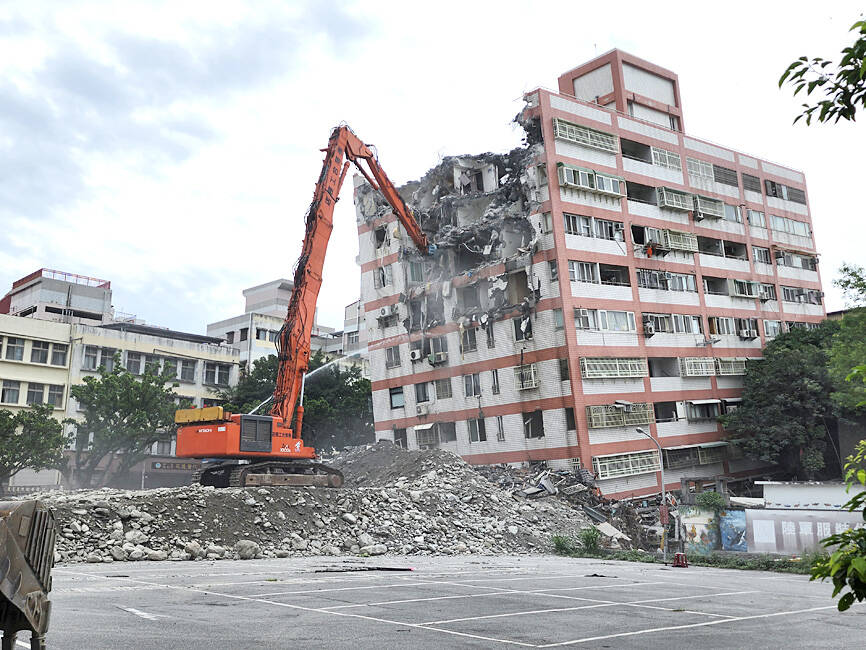People left homeless following a massive earthquake on April 3 are to receive NT$32,000 per month for a two-bed hotel room or NT$44,000 for a four-person room, the Tourism Administration and National Land Management Agency said yesterday.
The policy is expected to be in effect for three months, the agencies said in a statement, adding that the list of hotels and resorts would be vetted by the Hualien County Government.
The Tourism Administration said that more than 125 hotels and hostels were willing to provide nearly 1,200 rooms for the initiative.

Photo: Hua Meng-ching, Taipei Times
The administration said it forwarded the list to the Hualien County Government on Friday last week and hopes to soon receive notice of a finalized number of rooms.
The list of hotels and resorts would be made available as soon as possible to provide short-term placement for those displaced by the earthquake, which measured 7.2 on the Richter scale, it added.
Meanwhile, the Ministry of Foreign Affairs yesterday thanked the Czech Republic for its pledge to donate US$150,000 to help with earthquake relief efforts.
The ministry expressed its gratitude on behalf of the government and Taiwanese after the Czech Ministry of Foreign Affairs made the pledge on X earlier in the day.
“In early April, Taiwan was hit by the strongest earthquake in 25 years. It caused widespread damage to property, killing 18 people,” the Czech ministry wrote. “Czechia helps, where it is needed. Which is why we are sending 150 000 US dollars to Taiwan to help with the relief efforts.”
The Central European country and Taiwan have been like-minded partners and have repeatedly extended each other a helping hand when needed, the Ministry of Foreign Affairs said.
During the early stages of the COVID-19 pandemic, Taipei donated 1.35 million medical masks to the Czech Republic, while in return, Prague donated 30,000 doses of a COVID-19 vaccine to Taiwan, the statement said.
The Czech Republic has joined Japan, Lithuania, South Korea and Thailand in pledging donations to help with post-earthquake relief and reconstruction.

SHIPS, TRAINS AND AUTOMOBILES: The ministry has announced changes to varied transportation industries taking effect soon, with a number of effects for passengers Beginning next month, the post office is canceling signature upon delivery and written inquiry services for international registered small packets in accordance with the new policy of the Universal Postal Union, the Ministry of Transportation and Communications said yesterday. The new policy does not apply to packets that are to be delivered to China, the ministry said. Senders of international registered small packets would receive a NT$10 rebate on postage if the packets are sent from Jan. 1 to March 31, it added. The ministry said that three other policies are also scheduled to take effect next month. International cruise ship operators

NUMBERS IMBALANCE: More than 4 million Taiwanese have visited China this year, while only about half a million Chinese have visited here Beijing has yet to respond to Taiwan’s requests for negotiation over matters related to the recovery of cross-strait tourism, the Tourism Administration said yesterday. Taiwan’s tourism authority issued the statement after Chinese-language daily the China Times reported yesterday that the government’s policy of banning group tours to China does not stop Taiwanese from visiting the country. As of October, more than 4.2 million had traveled to China this year, exceeding last year. Beijing estimated the number of Taiwanese tourists in China could reach 4.5 million this year. By contrast, only 500,000 Chinese tourists are expected in Taiwan, the report said. The report

HORROR STORIES: One victim recounted not realizing they had been stabbed and seeing people bleeding, while another recalled breaking down in tears after fleeing A man on Friday died after he tried to fight the knife-wielding suspect who went on a stabbing spree near two of Taipei’s busiest metro stations, Taipei Mayor Chiang Wan-an (蔣萬安) said. The 57-year-old man, identified by his family name, Yu (余), encountered the suspect at Exit M7 of Taipei Main Station and immediately tried to stop him, but was fatally wounded and later died, Chiang said, calling the incident “heartbreaking.” Yu’s family would receive at least NT$5 million (US$158,584) in compensation through the Taipei Rapid Transit Corp’s (TRTC) insurance coverage, he said after convening an emergency security response meeting yesterday morning. National

The Forestry and Nature Conservation Agency yesterday launched a gift box to market honey “certified by a Formosan black bear” in appreciation of a beekeeper’s amicable interaction with a honey-thieving bear. Beekeeper Chih Ming-chen (池明鎮) in January inspected his bee farm in Hualien County’s Jhuosi Township (卓溪) and found that more than 20 beehives had been destroyed and many hives were eaten, with bear droppings and paw prints near the destroyed hives, the agency said. Chih returned to the farm to move the remaining beehives away that evening when he encountered a Formosan black bear only 20m away, the agency said. The bear